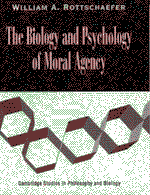Book contents
- Frontmatter
- Contents
- Preface
- Introduction
- PART I MORAL AGENCY AND SCIENTIFIC NATURALISM
- PART II THE BIOLOGICAL BASES OF MORAL AGENCY
- PART III THE PSYCHOLOGICAL BASES OF MORAL AGENCY
- PART IV A SCIENTIFIC NATURALISTIC ACCOUNT OF MORAL AGENCY
- PART V INTEGRATING A PERSONALISTIC AND NATURALISTIC VIEW OF MORAL AGENCY
- References
- Index
Introduction
Published online by Cambridge University Press: 19 September 2009
- Frontmatter
- Contents
- Preface
- Introduction
- PART I MORAL AGENCY AND SCIENTIFIC NATURALISM
- PART II THE BIOLOGICAL BASES OF MORAL AGENCY
- PART III THE PSYCHOLOGICAL BASES OF MORAL AGENCY
- PART IV A SCIENTIFIC NATURALISTIC ACCOUNT OF MORAL AGENCY
- PART V INTEGRATING A PERSONALISTIC AND NATURALISTIC VIEW OF MORAL AGENCY
- References
- Index
Summary
In this study I propose an account of the biological and psychological bases of moral agency. I am motivated to do so by a commitment common to many philosophers: the search for what Wilfrid Sellars aptly called the synoptic vision, the attempt to see things as a whole: “The aim of philosophy, abstractly formulated, is to understand how things in the broadest possible sense of the term hang together in the broadest possible sense of the term” (Sellars 1963, p. 1). In order to achieve a synoptic vision of the whole, Sellars aimed to articulate the connections between what he termed the manifest and scientific images of human persons. A guiding principle for my investigation is the new scientific naturalistic turn in philosophy, the attempt to bring to bear the best theories and findings of the sciences in the solution of philosophical problems.
The use of the sciences has immeasurably enhanced philosophical attempts to understand such phenomena as time, space, matter, motion, change, causality, and life. Today, philosophy of mind and epistemology are both feeling the positive effects of inputs from biology and the cognitive sciences. Scientifically informed philosophical investigations have, I contend, advanced the quest for a synoptic vision of things. However, I do not believe that a synoptic vision of human beings can be achieved without a similar endeavor in ethics or moral philosophy.
- Type
- Chapter
- Information
- The Biology and Psychology of Moral Agency , pp. 1 - 6Publisher: Cambridge University PressPrint publication year: 1997



